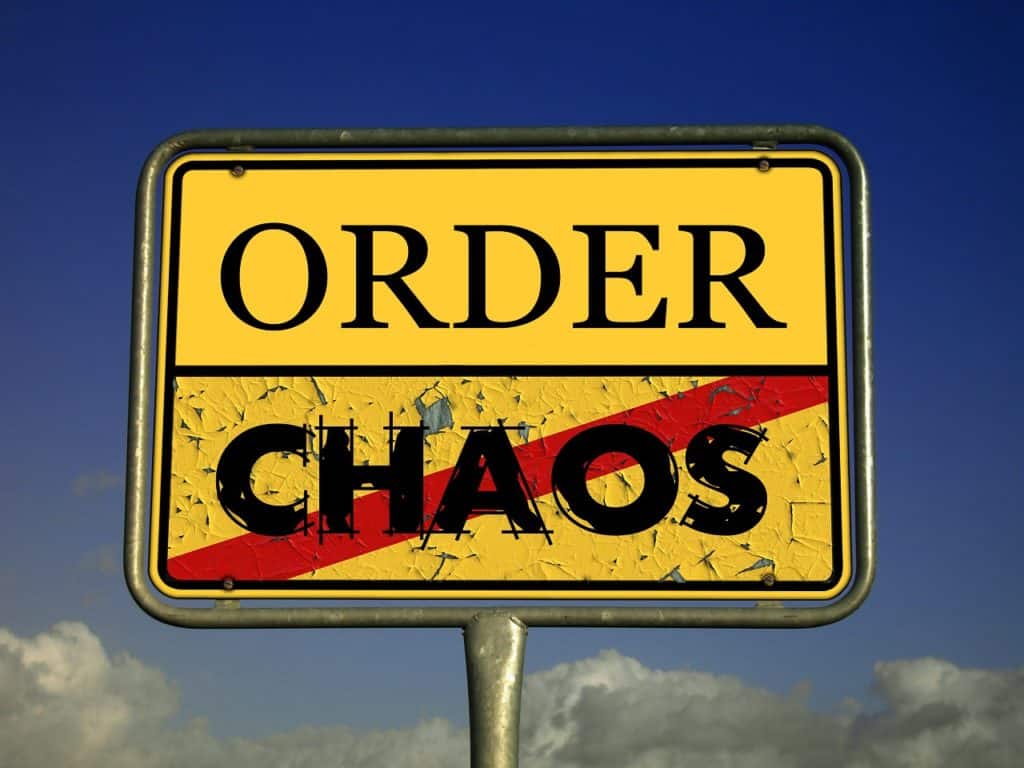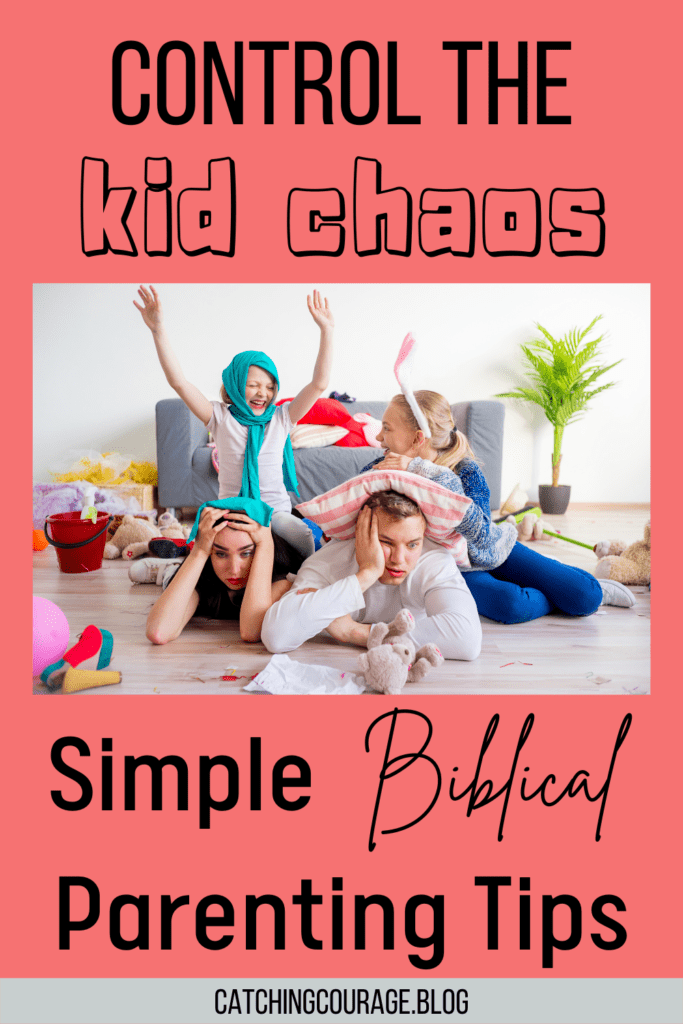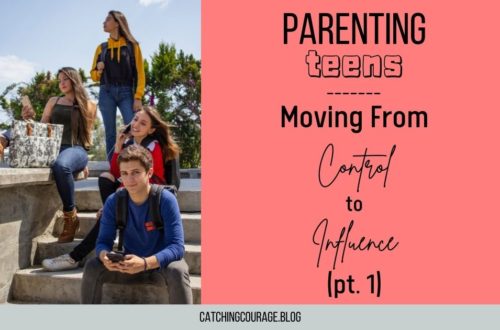Simple Biblical Parenting to Control the Kid Chaos
Guys, I have a confession to make – my home is in a near-constant state of kid chaos. There, I said it. It is chaotic, all the time, and I’m tired of it. Granted, 2 adults, 4 strong-willed kids, and a dog in an 800-square-foot house is going to mean chaos sometimes, but our house is always a mess because the kids don’t clean up after themselves and loud because someone is always having a fit of some kind or playing a little too rowdily for inside.
There’s bickering and arguing and disobedience – you name it, we got it. I long for a home filled with people who are happy, content, giving, cooperative, helpful, and kind, but no matter how much I beg, plead, cry, yell, punish, or reward, nothing changes. So I turned to the Bible to find some simple biblical parenting principles to help me train my kids to be Godly people.
But amid the chaos, there is one thing that spurs me on in the quest for a peaceful home. God is a God of order. All you have to do is look around to see it. The sun comes up every day. The sun sets every day. The mathematics evident in nature also demonstrates the orderly nature of God. Our bodies are so perfectly organized, that, even though they are so very complex, things rarely go wrong. Then when our bodies do fail us, they often are able to heal themselves. This doesn’t speak to a chaotic world, but one of order, cohesion, and cooperation. And if God is for order, so should we be.
I’m a serial overthinker, while at the same time being a shallow thinker, LOL! I make everything much more complicated than necessary, parenting included. With 4 kids, each with their own distinct personality, it seems difficult, even impossible, to tailor my parenting strategies for each of them. But even though each child does have some specific needs that are different from their siblings, there are some universal Biblical principles that we can apply to our parenting in general to make it a lot more simple and effective. We can:
- Parent like Jesus
- Use Ephesians 6:4 to guide us
- Let our “yes” be “yes” and our “no” be “no”
- Teach them biblical conflict resolution
By doing these things we are showing our kids the love of God, how to love others themselves, and how to have self-control, 3 things they will need to embrace to live a blessed life. Following is a description of each of these things, interlaced with some Bible verses on parenting.
Contents
4 Ways to Cut the Chaos
Biblical Parenting Means Parenting Like Jesus

Yes, I know, Jesus never had kids. But Jesus loved kids. This is clear from the story of the disciples sending the little children away from Jesus and being rebuked by Him for it. He also healed and resurrected kids just like He did adults. Plus, He told adults that they should have faith like children. Clearly, Jesus held children in a special place in His heart.
Not only did Jesus love kids, but Jesus is love. He embodies all that comes from love. He is gentle, He is kind, He is patient, He has self-control, He is humble. Now, I’m not saying we need to be soft parents. Jesus also loves justice and is capable of righteous anger. That’s right. There is a place for anger if expressed correctly. If we attempt to be all these things in our parenting, we will be showing our kids the face of their Savior, and what better way for them to become more like Him themselves?
Even more beneficial is taking the time to discuss what God’s love looks like and how we can show His love to others. Point it out when you see them and others acting in love, and point it out when they are not acting in love. Give them plenty of examples of what love looks like in today’s world so they begin to build up a mental storehouse of ways to act in love in different situations.
And be engaging. Jesus used stories, or parables, and questions to engage His students in dialogue and open their minds to His teachings.
Ephesians 6:4 Parenting
“Fathers, do not provoke your children to anger by the way that you treat them. Rather bring them up with the discipline and instruction that comes from the Lord.” Ephesians 6:4
Do Not Provoke Your Children to Anger
This is one of the most direct Bible verses for parents, and it contains several important tips for raising kids. Let’s talk first about not provoking children to anger. When our kids aren’t angry, they’re likelier to be happy, which naturally equals less chaos.

One BIG way to not provoke our children to anger is to set clear expectations. It isn’t fair to be vague about how we want them to behave and then punish them when we’re disappointed in their behavior. Instead, we tell them exactly what to do and how to do it and when to do it and make sure they understand. In this way, there can be no other reason for not doing it than sheer disobedience.
Another important way to not provoke our children to anger is to be consistent. If we allow a negative behavior one day because we’re too tired or busy to discipline, but then blow up at them for the same behavior the next day, they will get frustrated and confused. Furthermore, keeping discipline consistent between children will ensure every child feels that they have been treated fairly and that justice has been served.
And, as we will discuss in a little bit, letting our “yes” be “yes and our “no” be “no” is another way to keep from frustrating our children.
Discipline vs. Instruction in Biblical Parenting
Now let’s look at the second part of this verse, the part about bringing them up with discipline and instruction.
Discipline is defined as “the practice of training people to obey rules or a code of behavior, using punishment to correct disobedience.”
Instruction, on the other hand, is “detailed information telling how something should be done, operated, or assembled.”
So, basically, when training our kids, we must use a two-fold approach. We can’t be all discipline; that would be too harsh and negative. But, on the other hand, if we use all instruction but don’t discipline, they don’t see the necessity in doing what they’ve been instructed to do.

Instruction
First, we must instruct them. We do this by setting clear expectations, making sure they understand what they need to do and how they should do it, and then watching to make sure it gets done.
The third part is the hardest for me. I want to just give them their orders and then move on to something I want or need to do. But if I’m not careful to make sure my orders are being obeyed, what the kids learn is that I don’t really mean it when I ask them to do something and that they can get away with not doing it well or just not doing it.
Discipline

If we have set clear expectations and shown them what to do and how to do it, there is no reason for them to not do it except for sheer disobedience. And here is where the discipline comes in.
Have you heard the verse “Those who spare the rod of discipline hate their children. Those who love their children care enough to discipline them (Proverbs 13:24)?” It sounds callous on the surface, but if you really think about it, it makes sense.
As adults, your kids will need the ability to practice self-control and respect authority to be successful. Since we love our kids, we teach them these skills (and to honor and obey us, their parents, at the same time) in childhood so that they will live a long good life on the earth, like God tells us in one of the 10 commandments.
“Honor your father and your mother.
Exodus 20:12
Then you will live a long, full life…”
In our home, we use swats and time-outs for discipline, as well as loss of privileges. Which one we use depends on the situation and the child. You will need to decide what will work best for each of your kids. Lately, I have been trying really hard to tell them specifically what the consequence will be if they don’t obey.
Again, I feel this helps with expectations and gives me a stronger platform to stand on if I do need to dole out the discipline. In this way, they can see more clearly how their actions led to their consequences, while at the same time making it more difficult for me to wimp out.
BTW, in case you haven’t learned yet, disciplining your kids is hard. Every time I have to give a swat, I cry; no joke. But then I hold them and show them that I truly love them, and we are both ok.
It’s also a good idea to make it a point to not discipline until the offender sees his offense clearly and nobody is angry.
When someone knows they’ve done wrong and have a repentant heart, their heart is soft and much more likely to be changed by the discipline at hand.
And when a parent shows that they are disciplining out of love instead of anger, kids understand better that it is for their good that they are being disciplined. And having kids with soft hearts who know they are loved means they will be more likely to show God’s love to others, inside and outside the home, meaning, you guessed it, less chaos!
Yes and No
“Let your ‘Yes’ be ‘Yes’ and your ‘No’ be ‘No.’ For whatever is more than these is from the evil one.” Matthew 5:37

I have a hard time with this one. My memory is often bogged down by so many things I have to remember that I can’t recall answers I have given to the million and one questions my people ask throughout the day.
What happens is one child asks a question, maybe if can they have a piece of candy. I tell the child that, yes, after they eat a healthy lunch, they can. Then we both forget about it until much later, when they ask again. This time I say no, probably because I’m tired of saying yes (yes, this actually happens to me, LOL), and/or I answer before I’ve thought it through.
Or I tell my teen daughter that she can go shopping at the mall with a friend, but after thinking about it more I decide she can’t, for safety reasons.
Every situation like this is a breeding ground for disrespect and backtalk from the kids, and if they can be avoided by simply thinking things through before answering, everyone is better off. If you go a step further and explain your reasoning, you allow them to see through your eyes and appreciate God’s wisdom. Keep in mind also that it is ok to say that you need to think about it if you don’t feel like you have the right answer right away.
Say “Yes” More
On a related note, I feel many parents could say “yes” to their kids more. Why is “no” the knee-jerk reaction? Why do I freak out if I feel like I have said “yes” “too much?” Perhaps it’s because we are too wrapped up in our own lives and feel saying “yes” interrupts the flow of our day too much. Or is it because we’re afraid if we give in too often we will somehow spoil our kids? This may be true if we say “yes” because it’s more convenient for us than saying “no.”
But think about the long-lasting positive implications of saying “yes” to the right things (ie time spent with our kids, making memories, filling someone’s love tank) and act on that when the right things come up.
Kids are happier and less likely to be contributing to chaos when their love and attention tanks are full and they feel you truly care about what's important to them. Click To Tweet
To have your “Yes” be “Yes” and your “No” be “No,” simply think all decisions through thoroughly before answering questions. Ask yourself:
- “Have I already answered this question recently? If so, what was my previous answer?”
- “How will my answer affect the other members of the family?”
- “Will the requested activity fit into today’s schedule or might it be best to schedule it for later?”
- “Is there a good reason I shouldn’t say ‘yes’?
Teach Biblical Conflict Resolution
Another cause of chaos in our home is tattling. With 4 kids living in a small space and sharing rooms, there are lots of opportunities for one of them to do something that offends or hurts another one. Their first instinct for some reason is to run to Mom or Dad and tell on their sibling. If they choose to handle the conflict themselves, they tend to lash out physically. You could say that they all have a very strong sense of justice. LOL!

To apply this to biblical parenting, I am teaching my kids that if one of their siblings does something they don’t like, they should first tell them privately, preferably in a kind and gentle manner, that their actions hurt them in some way.
This gives the offending sibling a chance to soften their heart, apologize, and ask for forgiveness. If the offending sibling doesn’t do this, or if the offended sibling feels that the apology wasn’t sincere, then they can ask Mom or Dad to come help with the situation.
When I get involved in a conflict, I like to make sure everybody is calm first. Then I make sure to get both sides of the story and ask everybody to explain how they were feeling before and during the conflict. Usually, this is enough to open the eyes of both the offended and the offender. Then their hearts are most likely softened and they can make up.
Summary of Biblical Parenting Principles

Using these simple biblical parenting strategies can do these things if used consistently.
Parenting like Jesus shows our kids the love of God and how to have self-control.
Using discipline in conjunction with instruction can show them what love looks like and teaches them to do the right things at the right time for the right reasons.
Making sure we think through the answer to every question before answering ensures that we are minimizing opportunities for frustration and disrespectful behavior that is definitely not loving.
Finally, teaching our children to resolve conflict the biblical way allows them ample opportunities to see life through other people’s eyes and gain a greater love and respect for them.
And in teaching our children the love of God, how to love others, and how to have self-control, we can cut down on the kid chaos in our lives, live more peacefully with each other, and be blessed.
God blesses those who work for peace,
MATTHEW 5:9
for they will be called the children of God.

Catch you later,

PS Ginger Hubbard is one of my favorite biblical parenting advocates and teachers. Check out her site at Parenting with Ginger Hubbard – GingerHubbard. I especially like her book “Don’t Make Me Count to Three” and the “Wise Words for Mom” tool.
PPS If you’re in a challenging parenting season right now (who isn’t, right?), check out 19 Promises of God for Modern Parents for hope and encouragement!








One Comment
Pingback: